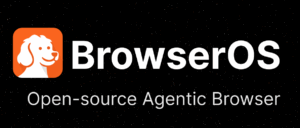The New Browser Battlefield: Where Your AI Agents Compete for Smarts on Your PC
Hi, I'm Tak@, a system integrator. Did you know that web browsers are no longer just "Browse tools"?
It might surprise you, but modern browsers act like independent operating systems, running a vast number of "web apps." Now, AI agents are making a serious entry into this "browser OS" realm, creating a new arena for competition.
For more details on AI agents, you can check out this article:
The Dawn of AI Browsers: What is BrowserOS?
BrowserOS is a privacy-focused, open-source browser that runs AI agents locally.
Why do we need such a new browser? I strongly believe it's to provide deep system integration, which traditional browsers lack, and the peace of mind that your user data won't leak externally.
BrowserOS is built on Chromium, the foundation of web browsers.
However, it's not just a "browser with a new skin." The development team has made direct, performance-critical changes at the C++ source code level of Chromium.
This results in 20 to 40 times faster execution speeds when AI agents click web page elements or input text, compared to JavaScript-based solutions.
I see this as a strong commitment to deeply understand the underlying principles of web browser operation and to improve them from the ground up. Furthermore, it fully supports existing Chrome extensions, which is appealing as users can smoothly transition within a familiar environment.
I view this approach, which balances privacy and performance, as a clear first step towards a "new web experience." The reassurance of having data in your own hands will hold immeasurable value for both businesses and individuals in the coming AI era.
A Solid Foundation and Philosophy Driving Development
BrowserOS development is being driven by a lean team of just two highly skilled individuals. Despite its small size, it supports macOS (Apple Silicon and Intel) and Windows, with Linux support planned, showing rapid platform expansion.
This speaks volumes about the developers' high technical expertise and efficient development process.
AI agent processing is performed locally through integration with Ollama. This is said to enhance privacy and improve automation capabilities by not relying on external servers.
The minimum hardware requirements are similar to Google Chrome, but it's important to note that additional resources will be needed if you run large language models (LLMs) locally via Ollama.
This project is 100% open source under the AGPL-3.0 license.
Regarding long-term financial sustainability, the project administrators plan a business model proven by other successful open-source projects: "offering enterprise licenses for a commercial version."
This allows the core browser to remain free and open source while generating revenue from enterprise customers who require additional features and support. I'm convinced that a solid business model is essential for long-term project growth.
The Core of "AI Agent Competition": Orchestrating Diverse AIs
The true essence of BrowserOS lies in its flexibility, allowing users to choose and switch between various AI models, truly a "competition of AI agents."
Why is this flexibility important?
Because it enables users to choose the optimal AI for their specific use case and privacy concerns, without being tied to a particular AI model. I strongly resonate with this philosophy.
While BrowserOS defaults to its own "BrowserOS AI," users can freely switch to OpenAI, Anthropic's Claude, Google Gemini, and locally running Ollama.
Especially with Ollama, you can run large language models on your PC without needing an API key. This achieves ultimate privacy protection, as sensitive data is not sent to external servers but remains on your computer.
For example, you could use a local Ollama model for highly confidential tasks and switch to Gemini or OpenAI for quickly getting the latest general information.
I'm confident that this wide range of choices will be key to integrating AI agents deeply into our daily work and learning.
My previous experience in developing systems for a medical university, where I touched on deep technologies that natively controlled the OS, resurfaced when I witnessed this C++ level optimization and AI fusion. I feel like users can freely "summon" AI agents and direct them to excel in their respective strengths.
Why Not Just a "Browser Extension"? The Developers' True Intentions
The reason BrowserOS was created as an independent browser, rather than just a browser extension, stems from the developers' deep technical insight and uncompromising design philosophy.
Standard browser extension APIs (Application Programming Interfaces) were insufficient to provide the deep system access required for AI agents to truly unleash their power.
Specifically, crucial features for AI agents to accurately understand web content and perform advanced automation, such as access to Chromium's accessibility tree, are intentionally restricted by Google Chrome to keep extension functionality lightweight, making them unavailable through standard APIs.
To enable AI agents to "understand entire web pages and interact like humans," modifications at the core browser level were necessary.
The development team stated that this decision "feels like the first time since Netscape in 1994 that we can rethink the browser from scratch."
I was deeply impressed by this strong resolve to pursue the ideal future browser without being bound by existing frameworks. Their philosophy of not just adding convenient features but fundamentally rethinking the architecture to create a truly user-beneficial experience resonates strongly with me as someone involved in system development.
Looking to the Future: Sustainability and Market Trends
BrowserOS adheres to the spirit of open source while also having solid plans for its long-term sustainability. The project administrators plan to adopt a business model proven by other successful open-source projects: "offering enterprise licenses for a commercial version."
This approach makes a lot of sense. The core browser remains free and open source under the AGPL-3.0 license, allowing anyone to freely use and improve it.
Meanwhile, by offering commercial licenses to enterprise customers who require additional features and enterprise-level support, the project can secure a stable revenue stream and enable continuous development and growth.
I believe this balance of being open source while also being a viable business is a crucial element for the project to continue contributing to society broadly, rather than remaining merely a hobby for technologists.
Furthermore, the timing of BrowserOS's emergence is quite interesting. With rumors that OpenAI plans to release its own browser this summer, the AI competition in the browser market is about to intensify.
In contrast to OpenAI's anticipated closed-source product, BrowserOS maintains its commitment to open-source development and local AI processing, which should be a significant appeal for users concerned about data privacy and corporate control over their Browse experience.
I'm very curious to see what kind of presence BrowserOS will have and how it will enhance its value as competition in this field heats up.
Analysis: AI Agents Weaving the "Transformation of Digital Work"
The arrival of BrowserOS is more than just a new browser hitting the market. I see it as a sign of a major transformation that fundamentally re-examines how we interact with our digital environment.
In the world of project management, there's a growing emphasis on focusing not just on deliverables but on the "value" and "outcomes" they generate.
I feel that BrowserOS, through its AI agents, aims to create "outcomes" and "value" that go beyond mere automation of operations.
For example, seemingly simple tasks like "reordering detergent from Amazon's order history" or "collecting information from websites and creating reports" traditionally involved opening multiple tabs, searching for information, and inputting data in conventional browsers.
However, in an environment like BrowserOS, where AI agents operate locally and at high speed, such tasks might become as seamless as "executing your thoughts directly."
I believe this not only dramatically increases individual productivity but also holds immense potential for automating routine tasks in business.
We have historically used browsers as "windows to access information." However, if AI agents become commonplace within them, the browser's role will shift to a "reliable partner that understands our intentions and acts autonomously."
For me, someone who has been involved in web service development for a long time, this is truly a "new frontier for digital productivity enhancement."
Of course, not all tasks may be solvable by AI agents, and there's no guarantee of always optimal performance. However, the possibilities are immeasurable.
Conclusion: Is Your Browser Ready for the Next Level?
The web browser is no longer just a portal for information. It is evolving into the "center" of our digital lives. Websites once transformed into "apps," and browsers became like "OSes" managing them.
Now, BrowserOS is ushering in a new era where AI agents are embedded, and users can choose their own AI models, leading to a "competition of AI agents."
Local AI processing for privacy, lightning-fast performance through C++ level optimization, and a diverse range of AI model choices have the potential to significantly change how we work, learn, and create in the digital world.
Are you ready to embrace such a browser and a new digital experience, where AI agents understand your intentions and autonomously perform tasks in a secure local environment?




